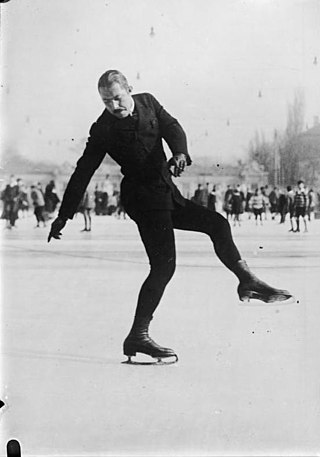| Johan Lefstad | |||||||||||||||
|---|---|---|---|---|---|---|---|---|---|---|---|---|---|---|---|
| Figure skating career | |||||||||||||||
| Country | |||||||||||||||
Medal record
| |||||||||||||||
Herbert Alward was an Austrian figure skater who competed in men's singles.
He won the bronze medal in men's single skating at the 1938 World Figure Skating Championships. [1] [2] [3]
| Johan Lefstad | |||||||||||||||
|---|---|---|---|---|---|---|---|---|---|---|---|---|---|---|---|
| Figure skating career | |||||||||||||||
| Country | |||||||||||||||
Medal record
| |||||||||||||||
Herbert Alward was an Austrian figure skater who competed in men's singles.
He won the bronze medal in men's single skating at the 1938 World Figure Skating Championships. [1] [2] [3]
| International | ||||
|---|---|---|---|---|
| Event | 1936 | 1937 | 1938 | 1939 |
| World Championships | 9th | 4th | 3rd | 5th |
| European Championships | 5th | 3rd | ||
| National | ||||
| Austrian Championships | 2nd | |||
Note: "Gau-Championships" ("Ostmark" Championships) were held instead of Austrian Championships from 1938 to 1943.

Eva Pawlik was an Austrian figure skater, show star, actress and commentator. She was the 1948 Olympic silver medalist, the 1948 World silver medalist, and the 1949 European champion.

Beatrix "Trixi" Schuba is an Austrian former competitive figure skater who competed in ladies' singles. She is a six-time Austrian national champion (1967–1972), a two-time European champion, a two-time World champion, and 1972 Olympic champion.

Karl Schäfer was an Austrian figure skater and swimmer. In figure skating, he became a two-time Olympic champion at the 1932 Winter Olympics and the 1936 Winter Olympics. He was also a seven-time World champion (1930–1936) and eight-time European champion (1929–1936). As a swimmer, he competed at the 1928 Summer Olympics in the 200 metre breaststroke.

Gillis Emanuel Grafström was a Swedish figure skater. He was born in Stockholm, Sweden. He won three successive Olympic gold medals in Men's Figure Skating as well as an Olympic silver medal in the same event in 1932, and three World Championships. Grafström is one of the few athletes who have competed in both the Summer and Winter Olympic games. He and Eddie Eagan are the only athletes to have won gold medals at both the Summer and Winter Olympic Games, although Eagan remains the only one to have managed the feat in different disciplines. He is one of the oldest figure skating Olympic champions.

Willy Böckl was an Austrian figure skater. He won the World Figure Skating Championships four times and captured two silver medals at the Winter Olympics, and he also won six European Championship titles. After the end of World War I, beginning in 1922, he won the European championships six times, except for 1924, when he did not compete. Also in 1922, he came in third place at the World Championships. He came in second place at the 1923 and 1924 World Championships, and then between 1925 and 1928, won the next four Worlds. He earned two silver medals at the Olympics in 1924 and 1928, both behind Swedish skater Gillis Grafström. He defeated Grafström in the free skating portion at the 1924 Olympics.
The Austrian Figure Skating Championships are a figure skating national championship held annually to determine the national champions of Austria. Skaters compete in the disciplines of men's singles, women's singles, pair skating, and ice dancing.
The World Figure Skating Championships is an annual figure skating competition sanctioned by the International Skating Union in which figure skaters compete for the title of World Champion. Men's and pairs' competitions took place from February 14 to 15 in Vienna, Austria. Ladies' competitions took place from January 31 to February 1 in Davos, Switzerland.
The World Figure Skating Championships is an annual figure skating competition sanctioned by the International Skating Union in which figure skaters compete for the title of World Champion.
The World Figure Skating Championships is an annual figure skating competition sanctioned by the International Skating Union in which figure skaters compete for the title of World Champion. The 1947 competitions for men, ladies, and pair skating took place from February 13 to 17 in Stockholm, Sweden. These were the first World Figure Skating Championships after World War II. Skaters from Germany, Austria, and Japan were not allowed to compete. It was the first time skaters from Australia competed at Worlds.

Inge Koch was a German figure skater who competed in pair skating.

Günther Noack was a German figure skater who competed in pair skating.
Gisela Reichmann was an Austrian figure skater who competed in ladies' singles.
Andor Szende was a Hungarian figure skater who competed in men's singles. He was later a coach and architect.
Johan Peter Lefstad (1870–1948) was a Norwegian figure skater who competed in men's singles.
Erich Erdös was an Austrian figure skater who competed in men's singles.

Kaj af Ekström was a Swedish figure skater who competed both in men's singles and pair skating.
Christa von Szabó was an Austrian figure skater who competed in pair skating.
Leo Horwitz was an Austrian figure skater who competed in pair skating.

Oscar Hoppe was a figure skater who competed in men's singles and pair skating. First he represented the German Empire, then Czechoslovakia. He was born in Troppau in what was then the duchy of Austrian Silesia in the Austro-Hungarian Empire, and died in the same city, which by then was in Czechoslovakia.
The Euler is an edge jump in figure skating. The Euler jump was known as the half loop jump in International Skating Union (ISU) regulations prior to the 2018/19 season when the name was changed. Its invention has been attributed to both to Carl and Gustav Euler, two Austrian brothers who won the men's pairs competition at the 1900 European Championships, as well as to Swedish figure skater Per Thorén, who won a bronze medal at the 1908 Olympics in London. It is thus also called the Thorén jump in Europe. It is also a jump used in artistic roller skating.
Herbert Alward.